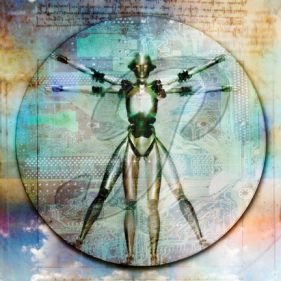O Google planeja supremacia quantum.
Google está construindo computador qu ntico de 50 qubits.
Something big happened this week at Singularity University.
79 participants from 49 different countries graduated from Singularity University’s 10-week flagship Global Solutions Program (GSP).
Over 30 team projects were launched during GSP, each focused on using exponential technology to address a massive global problem, such as water scarcity, malnutrition, and climate change.
Posted in government, life extension, singularity, space
I HIGHLY recommend reading this novel, as well as it sequels! It’s a beautiful, smart, and occasionally frightening exploration of what our civilization will look like post singularity, what WE will look like as posthumans, and where we might go from there.
The Golden Age is Grand Space Opera, a large-scale SF adventure novel in the tradition of A. E. Van vogt and Roger Zelazny, with perhaps a bit of Cordwainer Smith enriching the style. It is an astounding story of super science, a thrilling wonder story that recaptures the excitements of SF’s golden age writers.
The Golden Age takes place 10,000 years in the future in our solar system, an interplanetary utopian society filled with immortal humans. Within the frame of a traditional tale-the one rebel who is unhappy in utopia-Wright spins an elaborate plot web filled with suspense and passion.
Phaethon, of Radamanthus House, is attending a glorious party at his family mansion to celebrate the thousand-year anniversary of the High Transcendence. There he meets first an old man who accuses him of being an impostor and then a being from Neptune who claims to be an old friend. The Neptunian tells him that essential parts of his memory were removed and stored by the very government that Phaethon believes to be wholly honorable. It shakes his faith. He is an exile from himself.
Experts may reassure us that artificial intelligence won’t take over the world anytime soon – but they just might invade the multiplex.
At least that’s the plot developing at IBM, where the Watson artificial-intelligence team programmed a computer to come up with a scary trailer for “Morgan,” a thriller about a genetically modified, AI-enhanced super-human.
Physicists at the U.S. Department of Energy’s Princeton Plasma Physics Laboratory (PPPL) are building a “star in a jar” — a miniature version of the how our Sun creates energy through fusion. It could provide humankind with near limitless energy, ending dependence on fossil fuels for generating electricity — without contributing greenhouse gases that warm the Earth, and with no long-term radioactive waste.
But that requires a “jar” that can contain superhot plasma — and is low-cost enough to be built around the world. A model for such a “jar,” or fusion device, already exists in experimental form: the tokamak, or fusion reactor. Invented in the 1950s by Soviet physicists, it’s a device that uses a powerful magnetic field to confine plasma (superhot charged gas) in the shape of a torus.
Posted in Elon Musk, neuroscience
Posted in cyborgs, Elon Musk, neuroscience, robotics/AI
China is readying its next piloted space mission, a multifaceted undertaking that will lay the foundation for the country to build a space station in Earth orbit in the 2020s.
Both Tiangong-2 (whose name means “Heavenly Palace”) and the piloted Shenzhou-11 spacecraft are now undergoing checkout at the Jiuquan Satellite Launch Center in northwest China.
Tiangong-2, which is scheduled to launch in mid-September, is a true “space lab” that will verify key technologies for building China’s space station, according to its chief designer, Zhu Zongpeng. [Latest News About China’s Space Program].
A nice story out on transhumanism:
An idea that has frequently been used by science fiction is now starting to gain widespread attention by futurists, scientists, philosophers, and even the general public; the idea that the human species needs to use either artificial augmentations or gene manipulation to usher in the next stage of evolution. That idea is transhumanism.
 But why would humans want to willingly accelerate or initiate the next step in evolution? The positives of transhumanism are lofty goals that mankind has sought after for years, goals such as a world without diseases, ignorance, or even death. The only question, and an extremely important one, is how much is humanity willing to modify itself to attain those goals, and could the end result still be considered human? Some sources even suggest that in order to discuss individuals who are radically different from modern-day humans, the term “posthuman” must be used. Transhumanists who alter or augment themselves would theoretically at some point become a posthuman.
But why would humans want to willingly accelerate or initiate the next step in evolution? The positives of transhumanism are lofty goals that mankind has sought after for years, goals such as a world without diseases, ignorance, or even death. The only question, and an extremely important one, is how much is humanity willing to modify itself to attain those goals, and could the end result still be considered human? Some sources even suggest that in order to discuss individuals who are radically different from modern-day humans, the term “posthuman” must be used. Transhumanists who alter or augment themselves would theoretically at some point become a posthuman.
There are some examples that could be considered related to transhumanism. For example, vaccinations, laser eye surgery, and hearing aids are all technological innovations used to help improve the human body in some way. However, transhumanism suggests that humans in their current stage have not reached the end of their evolution, and that transhumanism itself, the modification of our bodies, would be the culmination of our evolution. However, transhumanism emphasizes that the next stage of evolution should be directed by humans rather than left to environmental or outside factors.